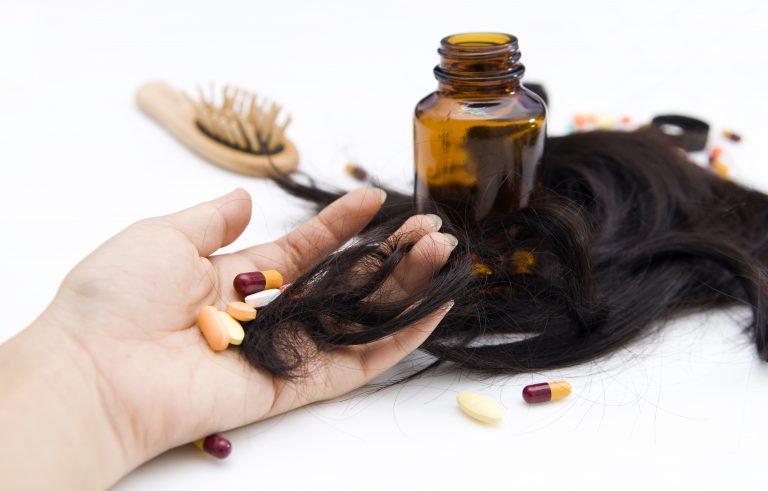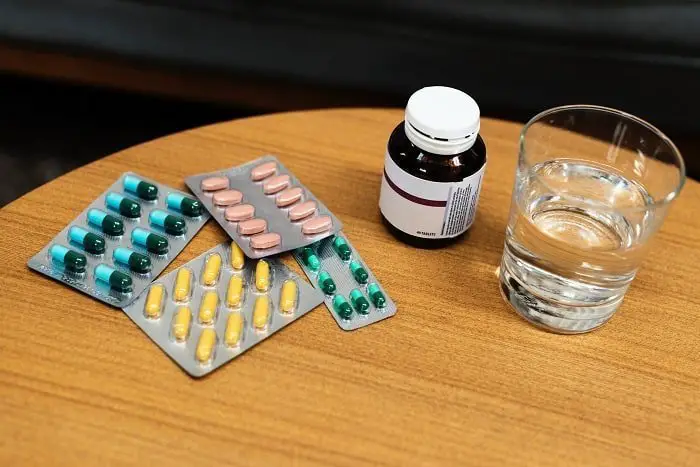
Page Contents
Can antibiotics cause hair loss?
This is one of the many questions I’ve been asked here over and over again, and I hope to answer that in this post.
There are several reasons you might be losing your hair, including the side effects of certain antibiotics. Therefore, you need to really find out if an antibiotic you’re taking is causing your hair to fall out.
Although it’s 100% normal to lose some of your hair each day as you style and comb it, if you’re suffering from excessive hair loss or you’re experiencing balding, then some medications you’re taking could be the cause.
In some cases, certain medications result in temporary hair loss, and once you’re able to adjust the dose of such medications or stop taking them entirely, your hair will grow back.
However, in other cases, some antibiotics can cause male or female pattern baldness, resulting in permanent hair loss.
For instance, when you use antibiotics to treat a bacterial infection, it can lead to excess shedding and temporary patchiness. To fight the problem, it is essential to know why antibiotics make your hair to fall out, and the best ways to reverse the hair loss, and that is precisely what this post will help you to achieve.
Can Antibiotics Cause Hair Loss?

According to the American Hair Loss Association:
Antibiotics have also been found to affect hair health. Their primary aim is to treat bacterial infections, such as strep throat or pneumonia.
Similarly, in his book, “The Probiotics Revolution,” Gary Huffnagle stated that:
Therefore, before using any medication, it’s of utmost importance to understand its potential side effects, and if they include hair loss. Additionally, you should know that not all drugs that can cause loss of hair will have the same impact on everyone that takes them.
The gravity of the hair loss may depend on the drug in question, the dosage you are consuming and the sensitivity of your body to the drug in particular.
What Medications Can Cause Hair Loss?

Why some medications cause you to lose your hair is because they’re toxic to the hair follicles (the cells responsible for hair growth). When the hair follicles are damaged, the normal cycle of hair growth is interrupted, which eventually results in hair loss.
Here are some medications that most commonly cause hair loss:
1. Male hormones
Male hormones are among the various causes of hair loss. Generally, men who take anabolic steroids or testosterone are likely to experience male pattern balding.
2. Acne medications (that contain Vitamin A)
While you’re trying to get rid of that stubborn acne and pimples, what you don’t know is that your hair could be falling out.
The primary ingredient in most acne medications is a processed Vitamin A (retinol, retinoids). However, this is not a notable risk when in its provitamin form, beta-carotene.
Typically, the precursor beta-carotene is only transformed into Vitamin A’s active form by the body when it’s required, avoiding harmfulness. Processed Vitamin A can result in telogen effluvium when taken in a large dosage.
You may find out that your hair does not fall out immediately when you start taking the drug – it often starts between 2 and 4 months after you’ve started the medication. Medications with Vitamin A include Retin-A (Tretinoin) and Accutane (Isotretinoin).
3. Anti-cancer and Chemotherapy drugs
Among all the drugs that cause hair loss, chemotherapy and anti-cancer medications are mostly known as a major cause of hair loss not just on the head, but facial hair as well including eyelashes, eyebrows, and other bodily hairs.
Additionally, not only does chemotherapy attack cancer cells – but it also attacks all of our healthy cells extensively, including hair follicles.
Related Reading
Here are some of the chemotherapies that cause hair loss:
- Doxorubicin
- Adriamycin
- Dactinomycin
- Cyclophosphamide
- Docetaxel
4. Female hormones
Regular intake of female hormones can also trigger hair loss. Hormone replacement therapy and oral contraceptives such as birth control pills can result in hormonal changes that may lead to your hair falling out.
Some of the hormonal medications that are known to cause female pattern baldness, and telogen effluvium include:
- Estrogen
- Birth control pills
- Progesterone
5. Beta-blockers
Beta-blockers are drugs that reduce your heart’s workload and help in lowering blood pressure. The beta-blockers that cause telogen effluvium are:
- Metoprolol (Lopressor)
- Atenolol (Tenormin)
- Nadolol (Corgard)
- Timolol (Blocadren)
- Propranolol (Inderal, Inderal LA)
6. Antifungals and Antibiotics
Hair loss is one of the hidden dangers of antibiotic use. Antibiotics reduce Vitamin B and hemoglobin levels, sometimes making the hair fall out faster than usual.
Hemoglobin is a protein that’s present in red blood cells and is responsible for transporting carbon dioxide from the body’s tissues to the lungs and oxygen from the lungs to the tissues. That’s not all, Myoglobin and Hemoglobin are equally critical for storing iron.
Furthermore, decreased hemoglobin results in an iron deficiency, which consequently causes dry and brittle hair and even falling out of the hair.
Also, Vitamin B and B-Complex Vitamins including B1, B2, B3, B5, B6, B7 (biotin), B9, and B12 are very essential for maintaining healthy hair growth, and thickness.
7. Antidepressants and mood stabilizers
Unfortunately, some people who take depression and mood stabilization drugs may also experience some level of hair loss.
And some of such drugs include:
- Haloperidol (Haldol)
- Paroxetine hydrochloride (Paxil)
- Amitriptyline (Elavil, Endep)
- Trimipramine (Surmontil)
- Amoxapine (Asendin)
- Clomipramine (Anafranil)
- Protriptyline hydrochloride (Vivactil)
- amitriptyline (Elavil)
- Desipramine (Norpramin, Pertofrane)
- Doxepin (Adapin, Sinequan)
- Imipramine (Janimine, Tofranil, Tofranil PM)
- Nortriptyline (Pamelor, Aventyl)
- Fluoxetine hydrochloride (Prozac)
- Sertraline hydrochloride (Zoloft)
8. Weight loss drugs
Some weight loss medications such as phentermine can also cause hair loss. However, the side effect is not often listed because dieters who lose their hair usually have a nutrient deficiency as well or may have some casual health conditions causing their hair loss.
Therefore, while some people taking weight loss pills have reported some cases of hair loss, this could be due to malnutrition.
Medications That Cause Hair Loss In Men
Men who take certain hormones may also experience permanent male pattern baldness or minor hair loss.
For instance, testosterone replacement therapy for the treatment of low testosterone can lead to hair loss. Similarly, the use of anabolic steroids to build muscle can equally lead to falling out of the hair.
Medications That Cause Hair Loss In Women
Like men, hormone therapies can also trigger hormone imbalances in women, thereby leading to hair loss – and possibly leading to permanent female pattern baldness.
For example, birth control drugs used for contraception and hormone replacement therapies (HRT), such as estrogen and progesterone. Also, women that have gone through a full hysterectomy need ongoing HRT after surgery.
How To Reverse Hair Loss From Medication

If you’ve been suffering from hair loss as a result of antibiotics, then I have some good news for you.
It might interest you to know that antibiotic-related hair loss is not permanent. Typically, this type of hair loss is an indication that new hairs are coming up, which is why excessive hair loss seldom lasts more than 6 months.
While the hair may appear thinner than usual, it’s only a temporary problem and fullness will return eventually.
However, if you’re not happy with those thinner curls, some practical measures can be taken to remedy the situation – and one option is to take vitamins that stimulate hair growth such as Vitamin B12, Omega-3 Fatty Acids, and Biotin.
It’s highly advisable to consult your nutritionist or doctor about these options before anything as many of the vitamins are not FDA approved and will likely impede the current medications.
Diet equally plays a significant role in hair health. For extra thickness, add more iron in your meal, and load up your plate with ingredients such as leafy greens and broccoli. Moreover, protein such as eggs, meats, and fish are also vital for hair growth.
Conclusion | Hair Loss Due To Medication Will It Grow Back?
Like I said earlier, antibiotics can cause temporal thinning hair. While this is not guaranteed, time and an increased focus on your diet intake will eventually return your hair to its normal state.
However, it is essential to consult a dermatologist about your hair loss issues within a week, or two of noticing your hair is falling out.
Numerous health issues can cause this symptom including thyroid issues and auto-immune diseases, so it’s always better to be proactive and seek professional advice right away.
Although antibiotic-related hair loss usually stops 6 months after antibiotics have left the system. But if you’re taking an antibiotic for a long time or need more than one round of antibiotics, you may not get back your hair in that 6-month time frame – and this can lead to feelings of discomfort, embarrassment, and stress.
Finally, if the thinning hair is really a result of antibiotic intake, a good physician can decide if the antibiotics can be discontinued or whether the dosage should be adjusted. An expert could equally recommend a change in your diet or prescribe a hair growth stimulant such as minoxidil (Rogaine).







[…] example, lots of medications are known to cause hair loss. So you need to find out if your hair loss occurred after you’ve […]
I had a bacterial infection that caused me to loose my gallbladder in surgery. Afterwards I was on intravenous Rocephin for nine weeks to kill this rare bacteria. I noticed within a month of being off the Rocephin my hair started looking thinner. I have very thick hair so most will not notice but I have lost a considerable amount of hair in the last two months. My hair is not falling out in large amounts like it was so I am wondering if it’s due to the rocephin. If so how long before my hair will return to normal and grow back. Thank you!
[…] as pain relief medications, anti-inflammatory medications to reduce swelling at the surgical site, antibiotics to reduce the risk of infection, […]